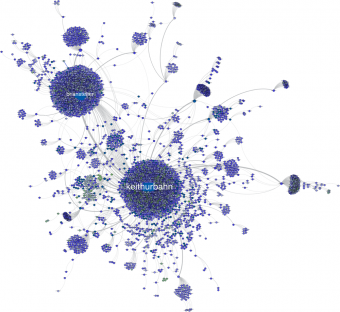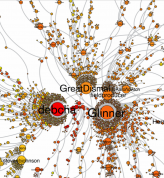
“No one is reading your e-mails”
By Daniel Saraga
March 5, 2012
Duncan Watts is a renowned network-theory scientist. He analyzes our internet footprints to better understand what connects us and what influences us.
It wasn’t just by chance that Duncan Watts, physicist turned sociologist, left prestigious Columbia University in 2007 for Yahoo! Labs. “Tools were being developed that could really help us understand the questions that I was interested in. These tools involved huge amounts of data and a lot of computing power,” says the Australian-born researcher. At Yahoo, his team is developing the “science of the Web,” even though he admits that “we don’t really know what it looks like yet.”
You have analyzed Twitter postings in an effort to understand how influence spreads. What did you find?
We studied the myth of “influential people,” a marketing strategy that focuses on a small group of people – “influencers” – in the hope that they will generate a snowball effect. Publicists always say, “go find the influencers!” without really concretely defining the concept or demonstrating that their hypothesis works. At the moment, you could say that we are all influencers.
We found that this method doesn’t work very well. People with a huge Twitter following – say a big celebrity like Paris Hilton – don’t necessarily have more influence in generating interest than a crowd of anonymous people. That’s not very surprising; I’d be more likely to follow the advice of a friend than someone I don’t know, even if that person is a celebrity.
Do trends get started by product quality, the group effect, or just by chance?
We looked at an online music site to observe how people made their choices. When people could see others’ opinions, they often ended up following them, but when we repeated the experiment, we observed that the songs that really worked were never the same. That confirms that chance plays a very big role – even in our artistic choices.
You claim in your latest book that we make serious mistakes in our analysis of past events.
We’re often convinced that our explanations of past events are the right ones – think for example of the idea that Facebook played an absolutely critical role in the Arab Spring revolutions in early 2011 or that a fashion trend was started by a small group of influential people. We believe in this because we have always had lots of intuition about human behavior. But in reality, we are incapable of predicting the future; when will the next revolution take place? That shows that our explanations of what’s happened don’t have very good predictive value.
I like the forest fire analogy: after the fact, you might find the match that started it. But the match isn’t anything special. The reason there was a forest fire was because the forest was in a state in which it was ready to burn. The same holds true for fashion or revolutions; when they occur, it’s because society is ready for them.
Network science is fascinating, but has it made an impact on real-world problems yet?
There are many examples where it could have an impact, but at the moment, I don’t know of any really important social problem that it has helped solve – such as reducing financial risk, solving unemployment or effectively organizing for catastrophes. The only one I can come up with is Page Rank (developed by Google), which is used by search engines.
My first paper on networks in 1988 focused on how all networks are the same, because they have the same properties (small world theory, ed.), but you have to be really careful with these kinds of generalizations. Physicists love universal principles. But when everything has the same property, it’s probably not the most interesting property. The distribution of wealth in populations always follows the Pareto law. Nonetheless, that doesn’t really help you do anything about it, politically.
I think that useful science comes in this sort of middle range, where you’re able to make statements that are somewhat general across specific contexts, but are still specific enough to be useful. If I had a recommendation for a network scientist it would be to spend less time thinking about patterns, and more time thinking about problems.

Paths taken by viral messages. The thicker a line, the more retweets that connection generated.The larger the node, the more retweets that user's participation generated.
© Socialflow, 2012
How did you go from being a physicist to being a sociologist?
I always wanted to be a physicist and understand nature. At the end of my undergraduate studies, I realized that the areas that interested me – particle physics and astronomy – were already too mature. I turned towards chaos theory, wondering how crickets synchronized their chirps without the help of a “conductor.” That led me to study how they were connected, and I realized that the same thing needed to be done to understand humans.
You say that sociology is the 21st century science. Is this because of the arrival of mathematicians and computer scientists?
Observing the online interactions of millions of individuals in real time is a unique opportunity. Nonetheless, technology isn’t everything. Contrary to physicists, who look at sociology as a trivial discipline because of the role that intuition plays in the field, I truly respect the sociologists’ point of view, which is: you really have to think carefully about the questions. It’s great to have all this data, it’s great to be able to program computers to analyze these huge data sets, but it still really matters what question you’re asking.
Technology also has its shadow side: there is a kind of anticorrelation between technical skills and caring about the questions.
What is your relationship with social media?
I try to keep everything on e-mail. I don’t IM, don’t really Twitter, don’t do much on Facebook, I don’t Skype. It’s not because I dislike any of these things, it’s just that I’m trying to avoid being distracted from my work.
I have a Yahoo account. Are you analyzing my e-mails?
We analyze the traffic and the terms people enter into search engines. No one is reading your e-mails. There is a lot of attention to privacy in the company. They are very, very concerned about protecting consumers. There is a lot at stake for us.
* Everything Is Obvious: *Once You Know the Answer (Crown Business, 2011)
This is an electronic version of an article published in Hémisphères Magazine.
Click here to print.
